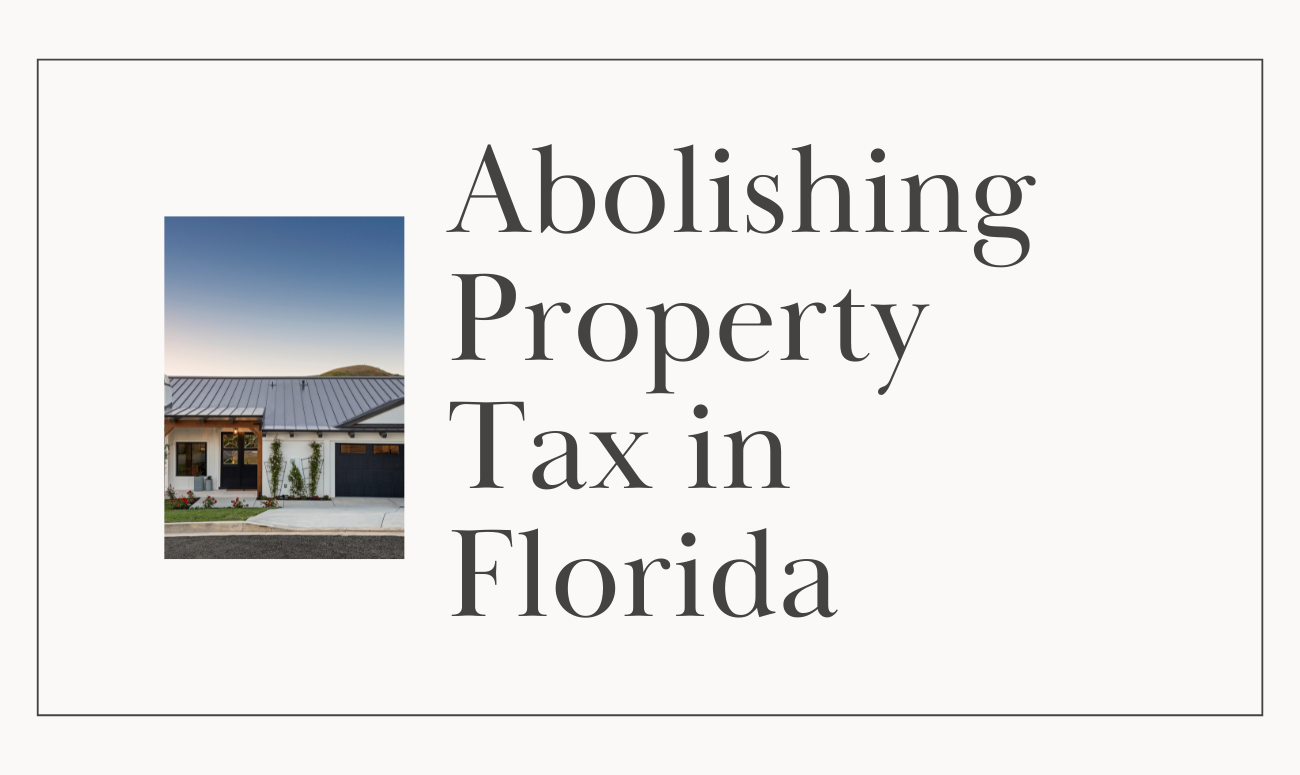Abolishing Property Tax in Florida: The Future of Property Taxes in Florida
Introduction
A controversial proposal currently making its way through the Florida legislature would completely eliminate property taxes in the state. If passed, the measure would direct the Office of Program Policy Analysis and Government Accountability (OPPAGA) to study the feasibility and potential impact of shifting the tax burden from property owners to consumers through an increased sales tax on goods and services. Proponents argue this would lift the burden of property taxes, which they view as unfair and tantamount to “renting” your home from the government. However, opponents worry about the impact on local government revenues and the regressive nature of a consumption tax. This issue is complex with reasonable arguments on both sides.
Abolishing Property Tax in Florida: The Case for Eliminating Property Taxes
Supporters of repealing property taxes, such as Rep. Ryan Chamberlin who introduced the bill in the House, point to two main justifications. Firstly, since property taxes must be paid every year, homeowners never truly own their homes outright. As Chamberlin argues, this amounts to “slavery” where people merely rent their property from the state. Secondly, he contends that increasing property taxes based on a home’s unrealized gains in value makes no sense. After all, homeowners do not pay income tax on potential income they could have earned. Consequently, Chamberlin believes shifting to a sales tax would be more equitable and spur economic growth. Other legislators, like Rep. Rick Roth, agree that removing property taxes would have a “multiplier effect” leading to wider homeownership. Still, these arguments in favor of the proposal have significant counterarguments.
Abolishing Property Tax in Florida: The Concerns Around Replacement Taxes
Several legislators raised issues about the feasibility of replacing property taxes with higher sales taxes on goods and services. For instance, Rep. Anna Eskamani argued this would provide less incentive for local governments to maintain high property values in their jurisdictions. Additionally, reliance on a single tax source dependent on consumer spending could lead to funding shortfalls during economic downturns. Rep. Joe Casello worried specifically about impacts on funding first responder services. Others noted sales taxes place a higher relative burden on lower-income individuals. In general, economists warn against overreliance on a single tax stream without offsetting revenue sources. Michigan and Pennsylvania have considered and rejected similar ideas after independent analysis revealed shortcomings. Thus, while property taxes are unpopular, replacing them may cause more problems than it solves.
Abolishing Property Tax in Florida: Conclusions and Compromises
There are good-faith arguments on both sides of this issue. Homeowners understandably chafe at paying taxes on an asset they nominally “own”, while local governments depend heavily on property tax revenues to fund schools, infrastructure, public safety and other essential services. Perhaps the solution lies in a compromise approach – rather than outright eliminating property taxes, the state could provide credits and exemptions to alleviate the burden on certain homeowners, financed in a way to minimize impact on municipalities. In any case, more independent study is warranted before pursuing a radical shift in Florida’s tax structure with many unknowable consequences. Reasonable people can disagree on the best path while having shared goals of fairness, simplicity and the public good.
Abolishing Property Tax in Florida: The Moral Argument for Ending Property Taxes
While practical considerations exist on both sides, there is also a moral and philosophical argument in favor of eliminating property taxes in Florida. At its core, this debate asks what right the government has to compel payments in perpetuity for private property that homeowners already hold the title and deed to. Requiring endless taxation implicitly denies people true ownership and control of land they have paid for and improved with their own labor and investments.
As Rep. Ryan Chamberlin compellingly argues, this amounts to a form of economic bondage to the state. The government allows conditional usage of property but ultimate authority remains with tax collectors. Even homeowners who pay off their mortgages still must fork over thousands each year to occupy houses they nominally “own.” No end exists aside from forfeiting the property. How free can one be in such an arrangement? The lack of autonomy inherent in property taxes contradicts American ideals of life, liberty and property rights.
Imagine if other assets functioned similarly – paying yearly taxes to retain ownership of vehicles, jewelry or other valuables. This would rightfully strike most as unjust and improper. Some may contend real estate differs due to its immobility and other factors, yet the principled case remains. People improving homes or businesses on properties expect exclusive rights to the fruits of their efforts. Ongoing property taxes make this impossible, shifting effort from citizens to state coffers.
Abolishing Property Tax in Florida: Increasing over time
Additionally, steadily increasing property taxes based on subjective assessments of market values deprive homeowners of their ability to benefit from their own good stewardship of properties. Even without selling, larger tax bills arrive because bureaucrats believe homes could fetch higher sales prices. Homeowners never consented to such arrangements enabling government revenue growth. The incentives become perverse when people wish for lower valuations to reduce their tax burdens.
In conclusion, reasonable people can disagree on the best practical implementation. But the ethical case for ceasing Florida’s property tax regime stands firm. Citizens should control the destiny of their legitimately purchased lands and buildings. Forcing perpetual payments to sustain ownership conflicts with most conceptions of justice. While reform poses challenges, the moral arc should continue bending toward greater liberty by abolishing this longstanding tax relic.
Abolishing Property Tax in Florida: Seeking Compromise Through Homestead Exemptions
While completely eliminating property taxes is the optimum choice, viable compromise solutions exist to ease the burden on Florida homeowners. Expanding homestead exemptions stands out as one balanced approach respecting both moral arguments against taxes and practical funding needs of local communities.
Florida already provides a generous $50,000 homestead exemption from assessed property values before calculating taxes owed. This discount helps reduce monthly payments, especially for lower-income households and fixed-income seniors. However, the state could alleviate burdens further by doubling the standard homestead exemption to $100,000. This would function similarly to tax credits by reducing the taxable value used by localities to set rates.
Abolishing Property Tax in Florida: Exemptions
For qualifying low-income residents, exemptions could grow higher, perhaps to $150,000 or more. This would provide substantial relief to those struggling most with annual taxes while living on limited means. Further tweaks may address factors like household dependents or income volatility for groups like agricultural workers.
The key is crafting an exemption framework primarily benefiting ordinary Floridians who sustain local economies. The state could backfill portions of missing local revenues if crafted judiciously. This prevents severe funding declines while recognizing the good faith frustration many feel toward taxes restricting their property rights.
Abolishing Property Tax in Florida: Conclusion
Combined with other reforms, expanded homestead exemptions seem a sensible middle path. They constitute a gesture of good will showing leaders understand homeowners’ financial challenges in living the American Dream. Alleviating anger around taxes may improve civic harmony as well. With creativity and willingness to understand differing views, balanced solutions can emerge.
If you are looking for a Top Realtor in St Petersburg FL visit https://avalongrouptampabay.com/




